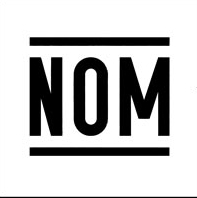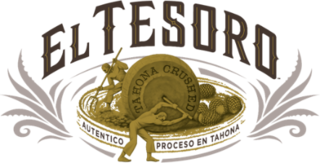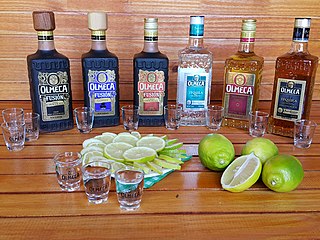
Tequila is a distilled beverage made from the blue agave plant, primarily in the area surrounding the city of Tequila 65 km (40 mi) northwest of Guadalajara, and in the Jaliscan Highlands of the central western Mexican state of Jalisco.

Mezcal, sometimes spelled mescal, is a distilled alcoholic beverage made from any type of agave. The word mezcal comes from Nahuatl mexcalli[meʃˈkalːi], which means "oven-cooked agave", from metl[met͡ɬ] and ixcalli[iʃˈkalːi]. Traditionally the word "mezcal" has been used generally in Mexico for all agave spirits and it continues to be used for many agave spirits whether these spirits have been legally certified as "mezcal" or not, and it is also considered a drink of artisan origin.

Ferromex is a private rail consortium that operates the largest railway in Mexico with combined mileage of 7,500 miles (12,100 km) and is part of the North American Class I railroads.

Agave americana, common names century plant, maguey, or American aloe, is a species of flowering plant in the family Asparagaceae, native to Mexico and the United States in Texas. It is cultivated worldwide as an ornamental plant, and has been naturalized in many regions, including parts of the West Indies, South America, Mediterranean Basin, Africa, Canary Islands, India, China, Thailand, and Australia.

Agave tequilana, commonly called blue agave or tequila agave, is an agave plant that is an important economic product of Jalisco, Mexico, due to its role as the base ingredient of tequila, a popular distilled beverage. The high production of sugars named agavins, mostly fructose, in the core of the plant is the main characteristic that makes it suitable for the preparation of alcoholic beverages.

Santiago de Tequila is a Mexican town and municipality located in the state of Jalisco about 60 km from the city of Guadalajara. Tequila is best known as being the birthplace of the drink that bears its name, “tequila,” which is made from the blue agave plant, native to this area. The heart of the plant contains sugars and had been used by native peoples here to make a fermented drink. After the Spanish arrived, they took this fermented beverage and distilled it, producing the tequila known today. The popularity of the drink and the history behind it has made the town and the area surrounding it a World Heritage Site. It was also named a "Pueblo Mágico" in 2003 by the Mexican federal government.

"Tequila" is a 1958 Latin-flavored surf instrumental written by Chuck Rio and recorded by the Champs. "Tequila" became a No. 1 hit on both the pop and R&B charts at the time of its release and continues to be strongly referenced in pop culture to this day.
Jose Cuervo is the best-selling brand of tequila, selling a fifth of the tequila consumed worldwide.

Patrón is a brand of tequila products by the Patrón Spirits Company with 40% Alcohol in each bottle.

The Norma Oficial Mexicana, abbreviated NOM, is the name of each of a series of official, compulsory standards and regulations for diverse activities in Mexico. They are more commonly referred to as NOMs or normas.

Pulque, or octli, is an alcoholic beverage made from the fermented sap of the maguey (agave) plant. It is traditional in central Mexico, where it has been produced for millennia. It has the color of milk, a rather viscous consistency and a sour yeast-like taste.

El Tesoro is a brand of tequila produced at a distillery in Jalisco, Mexico, where the family that founded the distillery is still involved in the business. In the United States, the brand is marketed by Beam Suntory. The producer claims to use labor-intensive traditional methods for making the tequila.
Don Cenobio Sauza, known as the "Father of Tequila," was one of the earliest and longest lasting distillers of the tequila spirit – founding the Sauza Tequila distillery – La Perseverancia – in 1873.

Olmeca Tequila is a tequila produced in Jalisco, Mexico. Olmeca is owned by the Pernod Ricard Group.
Bertha González Nieves is a Mexican businesswoman, whose career is rooted in the consumer luxury goods market.
"Salud" is the tenth episode of the fourth season of the American television drama series Breaking Bad and the 43rd overall episode of the series. It originally aired on AMC in the United States on September 18, 2011.

Tequila Herradura is a tequila distiller located in Amatitán, Jalisco, Mexico. It was formally founded in 1870 by Félix López and the business remained in the family for over 125 years. Today it is owned by US beverage maker Brown-Forman, but the tequila is still made in the same place and facilities under a Mexican subsidiary. Tequila products sold under the Herradura name are 100% agave. The company makes other tequila products such as El Jimador, which is the best selling tequila in Mexico, as well as New Mix, a tequila and grapefruit soda beverage. Since its acquisition by Brown-Forman, Herradura has had a number of promotional efforts in Mexico and the United States, including inviting artists to use tequila barrels as the bases for art pieces, which are then displayed and auctioned off for charity.
Agave Wine originates from Mexico. It is a fortified wine made from fermented blue agave, and fortified by being blended with blanco tequila. It is similar to tequila, in that it is harvested from the same plant. Although the two alcoholic beverages come from the weber blue agave plant, the drinks have similar, but different flavors. Agave wine has a much lower alcohol content and can be sold by vendors in the United States without an official liquor license. Also like tequila; agave wine comes in 100% de agave and mixto versions. 100% de agave wine has long been used in traditional Mexican margaritas and is said to make margaritas that are as good if not better than traditional tequila based margaritas.

Tubâ is a Filipino alcoholic beverage created from the sap of various species of palm trees. During the Spanish colonial period, tubâ was introduced to Guam, the Marianas, and Mexico via the Manila Galleons. They remain popular in Mexico, especially in the states of Colima, Jalisco, Michoacán, Nayarit, and Guerrero. Tubâ was also introduced to the Torres Strait Islands of Australia in the mid-19th century by Filipino immigrant workers in the pearling industry.













